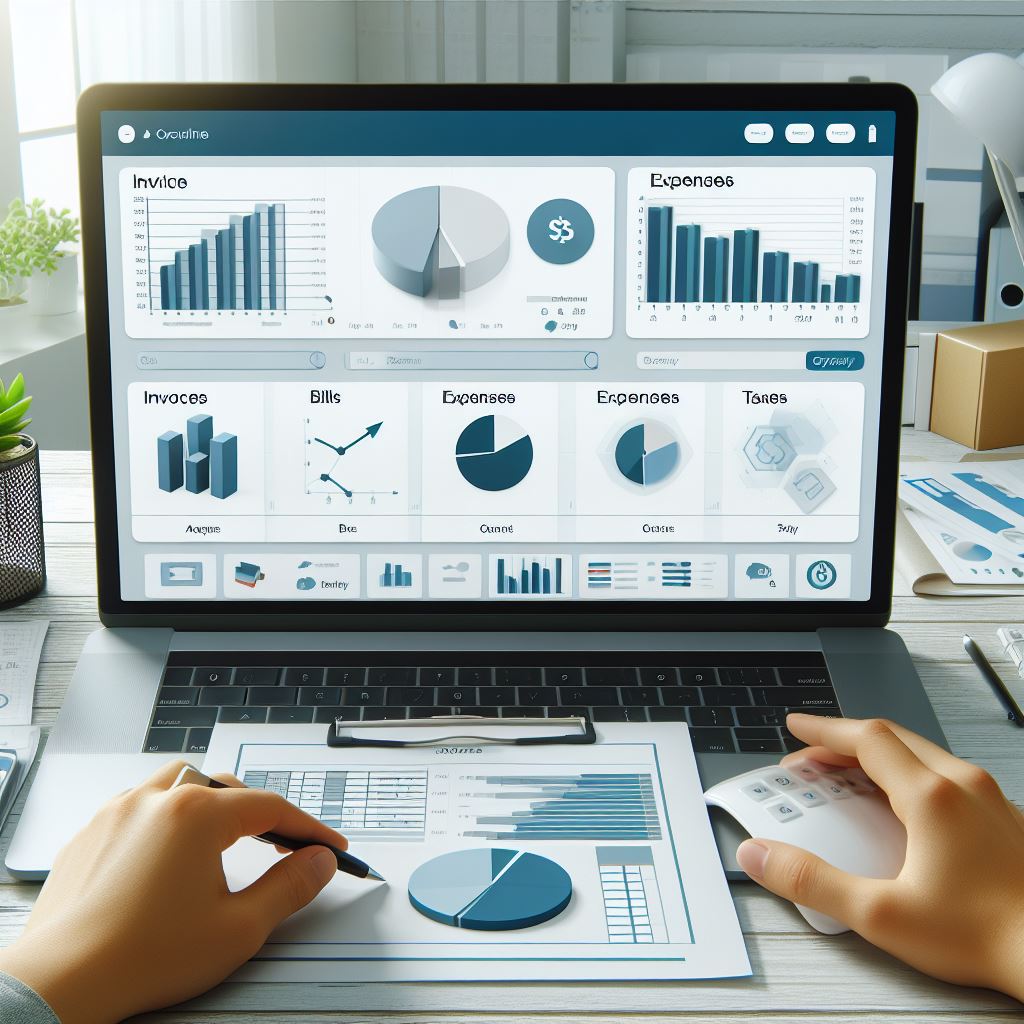
Accounting software plays a crucial role in the success of self-employed professionals by providing them with a comprehensive and efficient tool to manage their finances. Gone are the days of manually updating spreadsheets and crunching numbers; accounting software automates and streamlines various financial tasks, saving time and reducing the risk of errors. By accurately tracking income and expenses, generating invoices, and managing cash flow, accounting software empowers self-employed individuals to have a clear understanding of their business’s financial health.
Moreover, accounting software enables self-employed professionals to stay organized and compliant with tax obligations. The software simplifies the process of calculating taxes, generating tax forms, and ensuring timely payments. This not only saves time and simplifies the tax preparation process but also reduces the chances of penalties and audits. Additionally, accounting software provides a centralized platform where all financial data is stored securely, making it easy to access and analyze whenever required. This empowers self-employed professionals to make informed decisions concerning their business’s financial stability and growth. Overall, the importance of accounting software for self-employed professionals cannot be overstated, as it not only enhances productivity but also fuels their financial success.
Key Features to Look for in Accounting Software for Self-Employed Individuals
When it comes to choosing accounting software for self-employed individuals, there are several key features that can greatly enhance the efficiency and effectiveness of managing finances. One important feature to look for is the ability to track income and expenses. This feature allows self-employed professionals to easily monitor their cash flow, identify any discrepancies, and stay on top of their financial health. Additionally, the software should have a user-friendly interface, ensuring that even individuals with limited accounting knowledge can easily navigate and utilize the software’s functionalities. The ability to generate customized reports is another valuable feature to consider, as it enables self-employed individuals to analyze their financial data and make informed decisions based on real-time information.
Another crucial feature is the ability to integrate with other financial platforms, such as banks or payment processors. This integration allows for seamless importing and reconciling of financial transactions, reducing the time and effort required for manual data entry. Additionally, multi-currency support is essential for self-employed individuals who conduct business internationally, as it enables them to accurately track and convert currencies. Finally, data security should be a top priority when selecting accounting software. Look for software that offers robust encryption and data backup measures to ensure the safety and confidentiality of financial information. By considering these key features, self-employed individuals can find accounting software that aligns with their specific needs and helps them effectively manage their finances.
The Benefits of Using Accounting Software in Managing Self-Employed Finances
Accounting software has become a game-changer for self-employed professionals in managing their finances. With its user-friendly interface and automated features, it allows individuals to easily track their income, expenses, and financial transactions. This not only saves time and effort but also ensures accuracy in record-keeping, which is crucial for tax purposes and overall financial management.
Moreover, accounting software provides real-time data and insights into the financial health of a self-employed business. By generating reports and analyzing financial trends, individuals can make informed decisions about budgeting, forecasting, and strategizing for growth. This empowers self-employed professionals to have a better understanding of their cash flow, profit margins, and areas that require improvement. Ultimately, using accounting software enhances financial control and enables individuals to make more sound financial decisions.
Exploring Different Types of Accounting Software Suitable for Self-Employed Individuals
As self-employed individuals, finding the right accounting software can be crucial for managing finances effectively. With a variety of options available in the market, it’s important to explore different types of accounting software to find the one that best suits your needs. One type of software is cloud-based accounting software, which allows you to access your financial data from anywhere with an internet connection. This type of software is convenient for those who are constantly on the go or have remote teams. Another option is desktop accounting software, which is installed directly on your computer and can be accessed offline. This type of software often provides more robust features and can be a good option if you have complex financial needs.
Apart from these, there are also industry-specific accounting software options available for self-employed professionals. These software solutions are tailored to meet the specific requirements of certain industries, such as healthcare or construction. They often come with industry-specific features and integrations that can help streamline your financial management processes. Additionally, there are also free or low-cost accounting software options available for those who are just starting out or have simpler financial needs. These software solutions may have limitations in terms of features or support, but can still be a viable option for self-employed individuals on a tight budget. Overall, exploring different types of accounting software is essential to find the one that aligns with your business needs and helps you stay on top of your finances.
How Accounting Software Streamlines Bookkeeping Tasks for Self-Employed Professionals
Managing bookkeeping tasks can be a time-consuming and daunting process for self-employed professionals. However, with the advent of accounting software, these tasks have become much easier to handle. Accounting software streamlines the bookkeeping process by automating various tasks, such as recording income and expenses, tracking invoices, and generating financial reports.
One of the key ways in which accounting software streamlines bookkeeping tasks is through the automation of data entry. Rather than manually entering each financial transaction, accounting software allows self-employed professionals to connect their bank accounts and credit cards. This enables the software to automatically import and categorize transactions, saving valuable time and reducing the chance of human error. Additionally, accounting software can generate invoices and send them directly to clients, eliminating the need for manual creation and delivery. Overall, the automation features offered by accounting software greatly simplify and speed up the bookkeeping process for self-employed professionals.
Factors to Consider When Choosing the Right Accounting Software for Self-Employed Individuals
Factors to Consider When Choosing the Right Accounting Software for Self-Employed Individuals
When it comes to selecting the right accounting software for self-employed individuals, there are several factors to consider. First and foremost, compatibility with your existing systems is crucial. It is important to choose software that integrates seamlessly with your current financial management tools and processes. This will ensure smooth data transfer and prevent any disruptions or inconsistencies in your financial records.
Another important factor to consider is the scalability of the accounting software. As a self-employed professional, your business may grow and evolve over time. Therefore, it is essential to choose software that can accommodate your changing needs and can easily adapt to the increasing complexity of your financial transactions. Additionally, consider the user-friendliness of the software. Opt for a system that is intuitive and easy to navigate, even for those without extensive accounting knowledge. This will save you time and effort in training and allow you to focus on more critical aspects of your business.
Tips for Efficiently Implementing Accounting Software into Self-Employed Business Operations
To efficiently implement accounting software into self-employed business operations, it is crucial to start by identifying your specific needs and requirements. Take into consideration the size of your business, the complexity of your financial transactions, and the level of automation you desire. This assessment will help you select the most suitable accounting software that aligns with your business goals.
Once you have chosen the right software, it is important to invest time in familiarizing yourself with its features and functionalities. Take advantage of the available tutorials, user guides, and online resources to learn how to use the software effectively. Moreover, regularly update your knowledge and skills by attending training sessions or webinars offered by the software provider. By becoming proficient in using the accounting software, you can streamline your self-employed business operations and ensure accurate financial record-keeping.
Overcoming Common Challenges in Using Accounting Software for Self-Employed Accounts
One common challenge that self-employed individuals face when using accounting software is the learning curve associated with implementing new software into their business operations. For those who may not have a strong background in accounting or technology, it can be overwhelming to navigate through the various features and functions of the software. This challenge can be overcome by taking the time to invest in proper training and resources, such as online tutorials or workshops, that can help individuals become familiar with the software and its functionalities. Additionally, seeking assistance from accounting professionals or software support teams can provide valuable guidance and support in overcoming any technical hurdles that may arise.
Another challenge that self-employed individuals may encounter when using accounting software is the potential for errors or inaccuracies in data entry. As software relies heavily on accurate input of financial information, any mistakes or careless errors can lead to incorrect calculations or financial discrepancies. To mitigate this challenge, it is important for self-employed professionals to prioritize attention to detail and double-check all entries before finalizing them in the software. Additionally, implementing regular reconciliation processes and periodic reviews of financial reports can help identify and rectify any inaccuracies in a timely manner, ensuring the software is used effectively and generating accurate financial data for the business.
Maximizing the Potential of Accounting Software for Self-Employed Tax Preparation
While accounting software is useful for managing finances throughout the year, it becomes particularly valuable during tax season for self-employed professionals. With its integrated tax preparation features, accounting software can simplify the process of filing taxes, ensuring accuracy and saving time for individuals working for themselves.
One way accounting software maximizes its potential for self-employed tax preparation is by automating the calculation of deductions and credits. Instead of manually sorting through receipts and expenses, the software can categorize and track expenses throughout the year, ensuring that no deductible item is missed. Moreover, it can generate reports that summarize the various deductions and credits applicable to self-employed professionals, assisting them in maximizing their tax savings. By streamlining these processes, accounting software helps individuals focus on growing their business instead of getting lost in complex tax calculations.
Future Trends and Innovations in Accounting Software for Self-Employed Professionals
The world of accounting software for self-employed professionals is constantly evolving, with new trends and innovations emerging to meet the changing needs of users. One major trend that is expected to continue in the future is the development of cloud-based accounting software. This technology allows self-employed individuals to access their financial data from anywhere, at any time, using any device with internet capabilities. By storing their information on secure servers, users can take advantage of real-time updates and collaboration features, streamlining their financial management processes.
Another trend that is gaining momentum in the accounting software industry is the integration of artificial intelligence (AI) capabilities. With AI, self-employed professionals can automate repetitive tasks, such as data entry and categorization, freeing up more time to focus on their core business activities. Moreover, AI-powered software can analyze financial data, identify trends, and provide valuable insights, empowering users to make informed decisions and optimize their financial strategies. As technology continues to advance, it is anticipated that AI will play an even greater role in streamlining accounting processes and enhancing overall efficiency for self-employed professionals.
